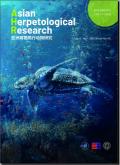陆生爬行动物Plestiodon chinensis(剑齿虎科)运动的季节适应
IF 1.2
3区 生物学
Q2 ZOOLOGY
引用次数: 8
摘要
对行为和生理过程的季节性适应的研究通常集中在水生或半水生变温动物身上,而对经历更多热异质性环境的陆生变温动物关注较少。本文通过对中国Plestiodon chinensis (Plestiodon chinensis)的运动进行对比研究和热适应实验,以验证这些陆生恒温脊椎动物在运动中是否存在季节适应,以及季节适应是否主要由热环境诱导。在自然种群中,在27°C至36°C的高测试温度下,石龙子在夏季比春季跑得快,但在18°C至24°C的低测试温度下则不然。热驯化实验表明,低温条件下,冷驯化的石龙子比热驯化的石龙子跑得快,而高温条件下则没有。因此,从运动热依赖性的季节变化和季节适应与热适应的差异可以看出,中国p.p chinensis发生了季节性适应,并可能受到温度和食物供应等其他因素的诱导本文章由计算机程序翻译,如有差异,请以英文原文为准。
The Seasonal Acclimatisation of Locomotion in a Terrestrial Reptile, Plestiodon chinensis (Scincidae)
Studies of the seasonal acclimatisation of behavioural and physiological processes usually focus on aquatic or semi-aquatic ectotherms and focus less effort on terrestrial ectotherms that experience more thermally heterogeneous environments. We conducted comparative studies and thermal acclimation experiments on the locomotion of the Chinese skink (Plestiodon chinensis) to test whether seasonal acclimatisation in locomotion exists in these terrestrial ectothermic vertebrates, and whether seasonal acclimatisation is predominantly induced by thermal environments. In natural populations, skinks ran faster during the summer season than during the spring season at high-test temperatures ranging from 27°C to 36°C but not at low-test temperatures ranging from 18°C to 24°C. In contrast, the thermal acclimation experiments showed that the cold-acclimated skinks ran faster than the warm-acclimated skinks at the low- test temperatures but not at high-test temperatures. Therefore, the seasonal acclimatisation occurs to P. chinensis, and may be induced by temperature as well as other factors like food availability, as indicated by the seasonal variation in the thermal dependence of locomotion, and the discrepancy between seasonal acclimatisation and thermal acclimation
求助全文
通过发布文献求助,成功后即可免费获取论文全文。
去求助
来源期刊

Asian Herpetological Research
ZOOLOGY-
CiteScore
2.80
自引率
7.10%
发文量
441
审稿时长
>12 weeks
期刊介绍:
AHR aims to provide a forum for herpetologists and related scientists interested in conducting international academic exchanges and joint studies, and a platform for introducing their newly made scientific and technological data, and publishing their research results and achievements in the world, but focusing on the Asian-Pacific Region.
The principal criteria of AHR for acceptance of articles for publication are the quality and significance of the research, breadth of interest of the work to the readership, and the clarity and effectiveness of communication. AHR welcomes submission of manuscripts from authors in all countries of the world, though with a focus on the herpetological studies in the Asian and Pacific Region, including major articles, shorter communications and review articles.
 求助内容:
求助内容: 应助结果提醒方式:
应助结果提醒方式:


